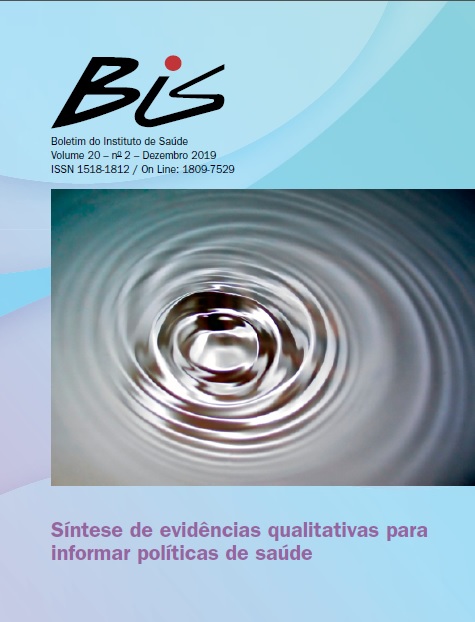Abstract
Syphilis affects more than 12 million people worldwide, and men are an important source of transmission for their partnerships when they are inadequately diagnosed and treated. Individual factors related to men may be important as barriers to seeking and adhering to appro-priate treatment. The objective of this study was to describe aspects related to the treatment of men with syphilis diagnosis, in their per-ception, of their partnerships, and health professionals. Was conduc-ted a rapid synthesis of qualitative evidence based on the analysis of qualitative primary studies, and a subsequent description of the results. The search was done in MEDLINE (via PubMed), EMBASE (via Elsevier), LILACS (via VHL), PsycINFO, grey literature in Google Scho-lar, without language or time restriction. Two reviewers performed the selection and the discrepancies were resolved by consensus. The me-thodological quality was evaluated using the CASP instrument. From 2881 studies retrieved, five were included. The selected contents we-re categorized for a better presentation of the results, showing that the aspects that can influence the male population in the treatment of syphilis are associated to schooling, gender perspective, low unders-tanding of the disease, and difficulties in accessing services, inclu-ding those related to the organization of the work process.
References
2. Organização Pan-Americana da Saúde (BR). [internet]. 2018 [acesso em 24 de out de 2018]. Disponível em: ht-tps://www.paho.org/bra/.
3. Moher D, Liberati A, Tetzlaff J, Altman DG. Preferred Re-porting Items for Systematic Reviews and Meta-Analyses: The PRISMA Statement. PLoS Med 6(7): e1000097.
4. Ouzzani M, Hammady H, Fedorowicz Z, Elmagarmid A. Rayyan—a web and mobile app for systematic reviews. Syste-matic Reviews. 2016;5(1):210.
5. Snilstveit B, Oliver S, Vojtkova M. Narrative approaches to systematic review and synthesis of evidence for internatio-nal development policy and practice. Journal of Development Effectiveness. 2016;4(3):409-429.
6. Critical Appraisal Skills Programme (2018). CASP (Qualitati-ve) Checklist. [online] Available at: https://casp-uk.net/wp-con-tent/uploads/2018/03/CASP-Qualitative-Checklist-2018_ fillable_form.pdf. Accessed: 30/03/2019.
7. Williams B, Garcia P, Carcamo C, Chiape Guiterrez M, De la Rosa Roca S, Calderon MV, Peeling R. Partner notification and treatment for maternal syphilis in Lima, Peru: knowledge, attitudes, and practices of health providers and patients. Sex Transm Infect. 2011; 87(1).
8. Rocha AFB, Araújo MAL, Miranda AE, Ponce de Leon RG, Silva Junior GB, Vasconcelos LDPG. Management of sexual partners of pregnant women with syphilis in northeastern Bra-zil: a qualitative study. BMC Health Services Research. 2019; 19:65.
9. Silva MRB, Silva AP, Messias CM, Silva HCDA, Silva LA, Ri-zzo ER. Conhecimento das puérperas sobre a sífilis: Transmis-são e tratamento. Revista Nursing, 2017;20 (224):1556-1560.
10. Silva Junior GB, Rocha AFB, Romualdo KS, Xavier PS, Araú-jo MAL. Primary healthcare workers’ perceptions regarding calling sexual partners of pregnant women with syphilis for tre-atment. Sex Transm Infect 2017;93(2):A1–A272.
11. Figueiredo MSN, Cavalcante EGR, Oliveira CJ, Monteiro MFV, Quirino GS, Oliveira DR. Percepção de enfermeiros sobre a adesão ao tratamento dos parceiros de gestantes com sífi-lis. Rev Rene. 2015;16(3):345-54.
12. Palacio MB, Figueiredo MAC, Souza LB. O cuida-do em HIV/AIDS e a atenção primária em saúde. Psico. 2012;43(3):360-367.
13. Brignol S, Dourado I, Amorim LD, Kerr LRSF. Vulnerabilida-de no contexto da infecção por HIV e sífilis numa população de homens que fazem sexo com homens (HSH) no Município de Salvador, Bahia, Brasil. Cad. Saúde Pública. 2015;31(5):1-14.
14. Amir J, Ginat S, Cohen YH, Marcus TE, Keller N, Varsano I. Lidocaine as a diluent for administration of benzathine peni-cillin G. Pediatr Infect Dis J. 1998;17(10):890–3.
15. Taylor B, Henshall C, Kenyon S, Litchfield I, Greenfield S. Can rapid approaches to qualitative analysis deliver timely, va-lid findings to clinical leaders? A mixed methods study compa-ring rapid and thematic analysis. BMJ open. 2018; 8(10).

This work is licensed under a Creative Commons Attribution 4.0 International License.
Copyright (c) 2019 Danielle Galindo Martins Tebet, Vanessa Calmont Gusmão Gigante, Wanessa da Silva Peres Bezerra, Jannayna Hammoud Brandão Hammoud Brandão, Micheli Luize Grenze, Anamaria Mello Miranda Paniago, Silvia Helena Mendonça de Moraes, Sandra Maria do Valle Leone de Oliveira, Jorge Otávio Maia Barreto
